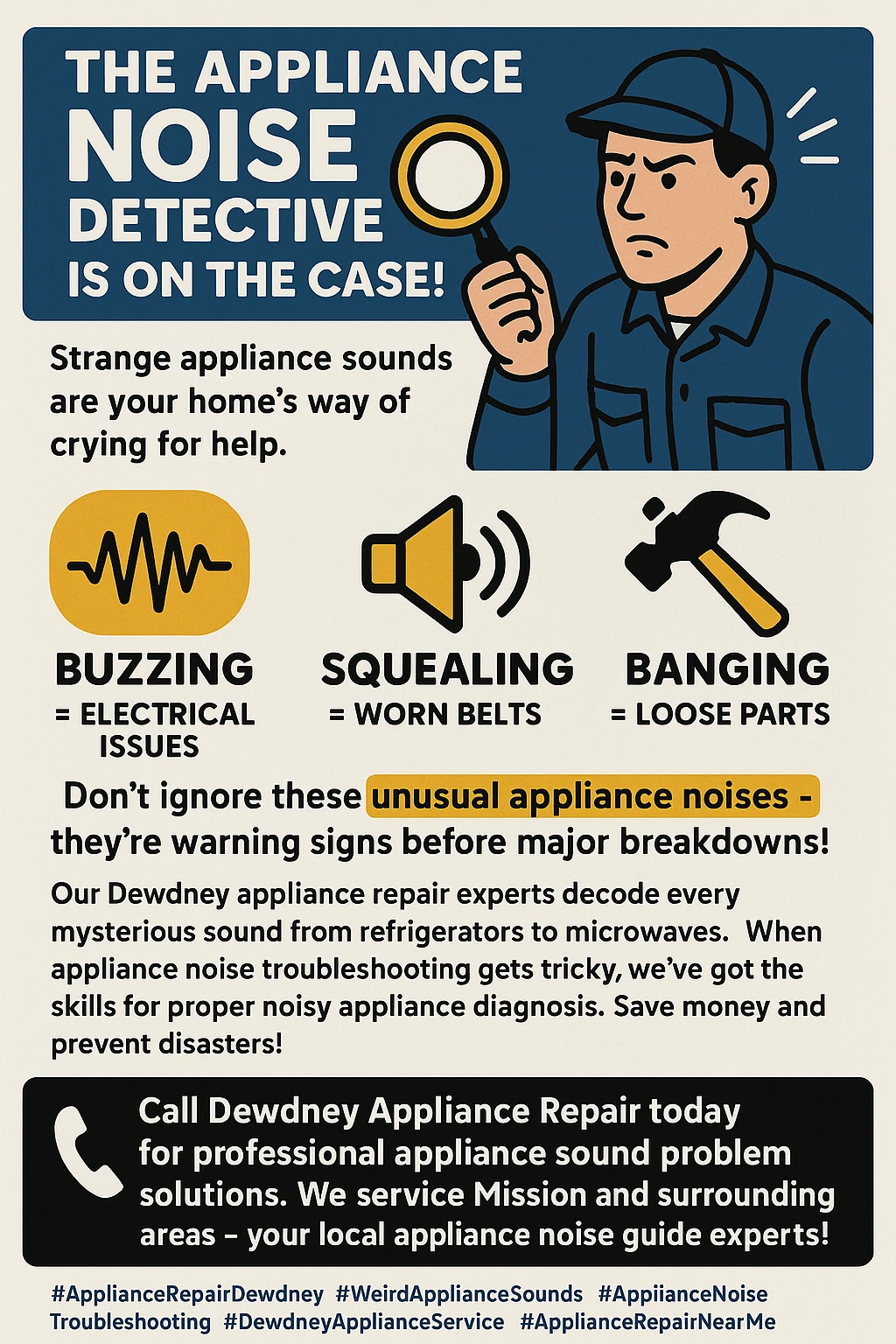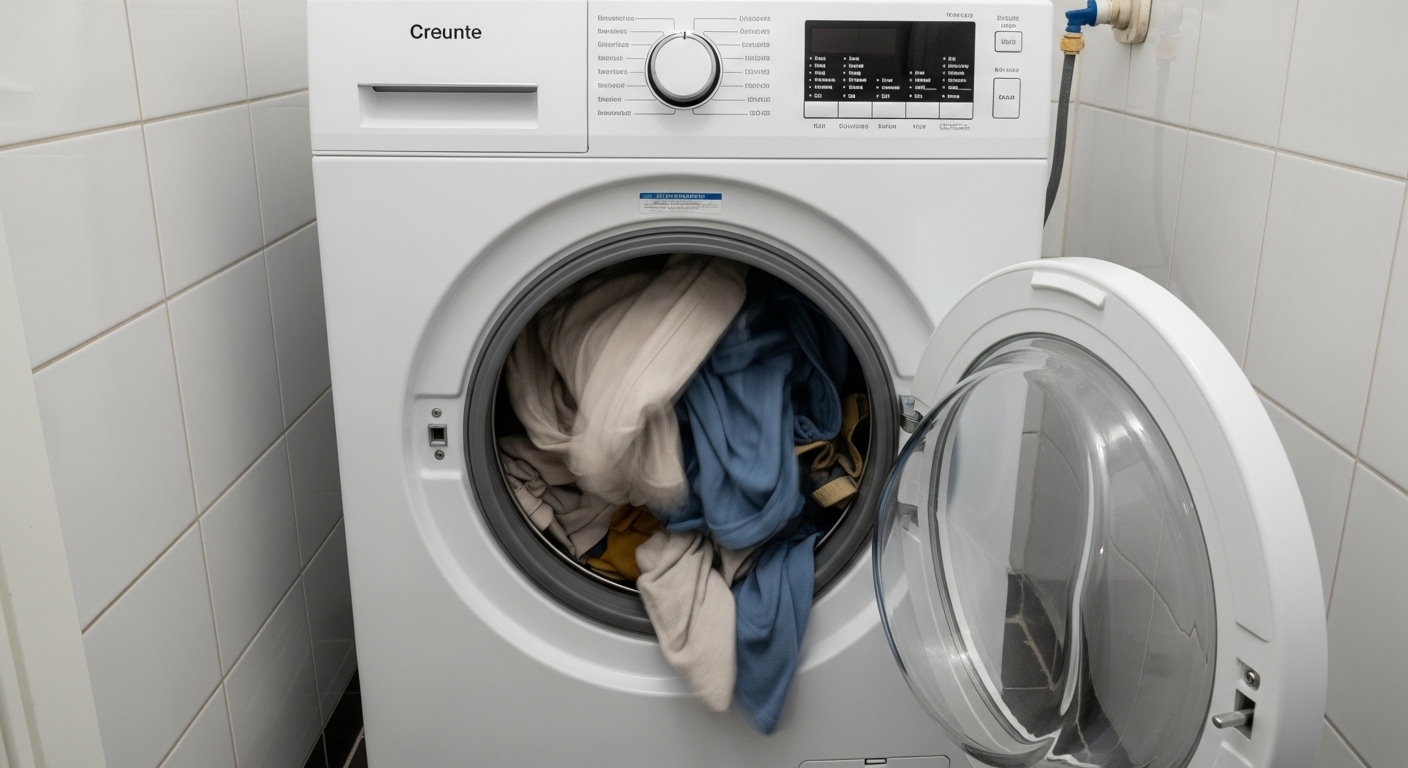The Appliance Noise Detective: What That Strange Sound Really Means (And When to Call for Help)
Is your refrigerator suddenly humming like a jet engine, or does your washing machine sound like it’s trying to escape the laundry room? Don’t panic – your appliances are actually trying to tell you something important, and learning their language could save you hundreds of dollars in emergency repairs.
Picture this: you’re enjoying a quiet evening at home when suddenly your dishwasher starts making a noise that sounds suspiciously like a blender full of marbles. Your first instinct might be to turn up the TV and pretend it’s not happening – trust me, I’ve been there! But here’s the thing: those weird sounds aren’t just random mechanical hiccups. They’re actually your appliances’ way of crying for help, and ignoring them is like ignoring your car’s check engine light while driving cross-country.
As someone who’s spent way too many Saturday mornings googling “why does my dryer sound like a dying moose,” I’ve learned that becoming fluent in appliance-speak is basically a homeowner superpower. Every hum, bang, and squeal tells a story, and once you know how to decode these audio clues, you’ll feel like Sherlock Holmes with a toolbox. The best part? Catching problems early often means the difference between a quick $50 fix and a $500 replacement disaster.
Think of your home as an orchestra where each appliance plays its own tune. When everything’s working properly, it’s a harmonious background symphony you barely notice. But when something goes wrong, it’s like the violin section suddenly starts playing death metal. Today, we’re going to turn you into the conductor of this mechanical orchestra, teaching you to recognize when your appliances are playing their happy songs versus when they’re screaming for professional intervention.
Key Outtakes:
- Banging, grinding, and electrical buzzing sounds almost always signal serious problems requiring immediate attention
- Many appliance noises can be resolved with simple troubleshooting like checking power sources, cleaning filters, and leveling units
- Persistent or growing sounds accompanied by poor performance indicate professional repair needs
- Understanding normal operational sounds helps distinguish between harmless quirks and dangerous warning signs
- Early noise detection and intervention prevents minor issues from escalating into major appliance failures

Decoding the 5 Most Dangerous Appliance Sounds
![]()
Not all appliance noises are created equal, and some sounds should make you drop everything and investigate immediately. Think of these as the smoke alarms of the appliance world – they’re loud, annoying, and absolutely demanding your attention for good reason. I learned this lesson the hard way when I ignored a grinding sound from my washing machine for three weeks, only to discover that what could have been a $30 belt replacement had turned into a $400 transmission rebuild.
The scariest part about dangerous appliance sounds is how quickly they can escalate. What starts as a minor mechanical hiccup can snowball into a catastrophic failure faster than you can say “home warranty claim denied.” But here’s the silver lining: these sounds follow predictable patterns, and once you know what to listen for, you’ll be able to catch problems before they empty your bank account.
Let’s dive into the top five sounds that should immediately trigger your inner appliance detective. These aren’t the gentle hums and occasional clicks that are part of normal operation – these are the red-alert, drop-everything-and-investigate sounds that separate minor maintenance from major disasters.
Banging and Thumping Sounds

If your appliances are making sounds like an angry poltergeist, you’ve got a banging or thumping situation on your hands. This is probably the most universally alarming appliance sound because it literally sounds like something inside is trying to break free. In washing machines, banging often indicates an unbalanced load causing the drum to hit the cabinet, a broken or loose drive belt slapping against the frame, or damaged drum bearings allowing excessive movement.
The tricky thing about banging sounds is that they can start intermittently – maybe just during the spin cycle or when the dryer is heavily loaded – which makes it tempting to ignore them. But here’s what’s actually happening: with every bang, your appliance is literally beating itself up from the inside. Components are hitting other components, screws are loosening, and what started as a minor alignment issue becomes structural damage.
For air conditioners, banging might mean loose or broken internal components, a compressor that’s about to fail, or refrigerant line issues causing pressure problems. The key is to never let banging sounds become your new normal – they’re always a sign that something mechanical has gone wrong and needs immediate attention.
Grinding or Metal-on-Metal Noises

Grinding sounds are like nails on a chalkboard, but for your appliances, and there’s a good reason they make you cringe. Grinding sounds indicate friction where it shouldn’t exist, often meaning protective lubricants have failed or parts are misaligned. When you hear that distinctive metal-on-metal scraping, it means your appliance is literally wearing itself down with every operation.
Common sources include refrigerator compressors with failing bearings, garbage disposals with objects caught in the blades, washing machine transmissions with worn gears, and blenders or food processors with damaged bearings. The urgency level here is high because grinding creates heat, and heat accelerates damage exponentially. What might start as a worn bearing can quickly escalate to a seized motor or cracked housing.
Here’s a pro tip I wish someone had told me earlier: grinding sounds require immediate attention because metal-on-metal contact creates heat and accelerates damage. The longer you wait, the more likely you’ll need to replace the entire appliance rather than repair a specific component. It’s like the difference between getting a small cavity filled versus needing a root canal – early intervention is always cheaper and less traumatic.
Electrical Buzzing and Humming
While some electrical humming is totally normal, excessive buzzing is like your appliance’s way of saying “I’m working way too hard right now.” The difference between normal and problematic buzzing lies in volume, pitch, and frequency. Normal electrical equipment makes a gentle, consistent hum that you barely notice. Problem buzzing is loud, irregular, and often accompanied by other warning signs like unusual heat or burning smells.
Excessive buzzing often indicates electrical problems that could pose fire risks, particularly from refrigerator compressors working harder than designed or microwave transformers with internal shorts. Dishwasher motors with failing windings or any appliance with loose electrical connections can also produce concerning electrical noises.
This is where appliance detective work gets serious – electrical problems should never be ignored or postponed. If you notice unusual buzzing, especially combined with burning smells or appliances that feel hot to the touch, disconnect the power immediately and consult a qualified repair technician. Your safety is worth more than any appliance, and electrical issues can escalate from annoying to dangerous incredibly quickly.
Continuous Clicking Sounds
Occasional clicks are normal – thermostats cycling, components engaging, systems starting up. But continuous or rapid clicking is your appliance’s equivalent of Morse code for “something’s wrong.” Gas appliances that click repeatedly without igniting, refrigerators with repeated clicking from the compressor area, or HVAC systems clicking rapidly at the control panel are all crying for help.
The most concerning clicking comes from gas appliances because persistent clicking in gas appliances is particularly concerning as it may indicate failed ignition attempts while gas continues to flow, creating potential explosion hazards. This isn’t the time for DIY troubleshooting – turn off the gas supply immediately and call for professional service.
For non-gas appliances, continuous clicking usually indicates control system failures, failing relays, or motors that are trying to start but can’t engage properly. While not immediately dangerous like gas-related clicking, these issues typically worsen rapidly and can lead to complete system failures if ignored.
Popping and Cracking Noises
Popping sounds occupy a weird middle ground in appliance diagnostics because some popping is completely normal while other types signal serious problems. Refrigerators commonly make popping noises from the expansion and contraction of materials during temperature changes, and ovens often pop when heating elements warm up. The key is understanding the difference between thermal expansion popping and problem popping.
Concerning popping typically comes with other symptoms: reduce

